There’s a rhetorical device named “apophasis”, “paralipsis” or, confusingly, “occupatio” in which you renounce any intention to mention, say, your opponent’s pyromania because it would cheapen the debate. For instance the New York Times’ “Climate Fwd.” newsletter recently wrote that “It’s been unusually hot recently in some scorching-hot parts of the world. And it’s been unusually hot in places that aren’t accustomed to being hot at all, especially this time of year.” It then refused to draw a link to global warming, saying “It’s not yet known whether these individual heat waves are directly linked to climate change. Attribution studies, as they are called, take a while to carry out.” But shucks, folks, “the heat waves are consistent with the overall trend of accelerating global warming. As average temperatures rise because of industrial emissions in the atmosphere, heat records are more frequently broken. The global trend is clear: 18 of the 19 warmest years on record have occurred since 2001”. So if you ask us to prove the charge we deny ever calling him an arsonist. Though he does smell of gasoline.
The Times talks as if the whole world were ablaze. But of course parts are unseasonably cool. Some are still concerned that the cold wet spring will be bad for North American crops and even that it might be part of an ominous trend driven by the same quiet sun they think ended the Medieval Warm Period. But extreme weather has become such an essential component of the scare campaign that it shows up constantly when it’s hot. Let a scorching wind from the Sahara hit Europe and “Experts say such heatwaves early in the summer are likely to be more frequent as the planet heats up.”
Likely to be. Experts say. Plausible deniability with unmistakable innuendo. At the same time, should Austrian glaciers show remarkably strong growth over the winter due to snowfall that set at least one all-time record, well, don’t you know the difference between weather and climate? And if there’s no trend in ice breakup dates in western Hudson Bay, go find something that looks like a trend somewhere else. (Including the UN saying “the World Meteorological Organization said today the Earth is set to experience its five warmest years on record from 2015-2019. Increasing greenhouse gas concentrations will fuel the global heat — and accompanying ice melt, glacier retreat, sea level rise, ocean heat and extreme weather for generations to come, the agency said.” But that “five warmest” formulation, which depends on sketchy global measurements not superior American data, conceals a cooling trend since 2016 and the WMO doesn’t commit to 2019 being hotter than 2018 while blaming CO2 for making it so.)
So NBC says Himalayan glaciers are melting twice as fast as they did between 1975 and 2000. As for the growth of Jakobshaven in Greenland, not relevant. Though as David Whitehouse observes on the Global Warming Policy Forum, the complex question of glacier behaviour is further complicated by the fact that Himalayan melting apparently increased during the warming “hiatus”. Which some people don’t believe in on the la la la I can’t HEEEAR you principle. And as Roy Spencer just pointed out, if the Great Lakes drop, alarmists blame global warming and if they rise again, they blame the climate emergency without ever committing themselves to a solid, refutable claim.
Innuendo might be effective in gossiping. And just possibly it could protect you against an action for libel. But it’s not how science is done. Science relies on prediction and causation, not a nudge and a wink.


